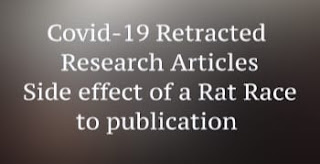The side-effect of the rat race to publish
Hitting the Pub Med search tab with the keyword Covid-19 lists a whopping 1,35,105 results for the articles published between 2019-2021.
Yes, researchers have been working very hard, however, many if not all are seeing this just as an opportunity to publish articles on a topic receiving intense interest from around the globe. The shooting number of research articles is also a consequence of researchers staying at home due to lock down and focusing just on writing rather than conducting research in the labs.
Moreover, journals have developed a soft corner for those researchers who are publishing covid-related articles. According to a Nature article Covid related publications were peer-reviewed faster at medical journals while other research articles took longer than usual to get published.
Compared with other topics, articles on COVID-19 have been shown to generate more citations. So, just to earn those citation numbers people are minting research articles as if publishing a newspaper column.
As of dated 18/5/2021, 109 papers published on Covid-19 have been retracted while 6 others have earned expressions of concerns. It is still early to conclude whether covid related publications are more prone to retractions than compared to other articles, as many other anomalous articles might still haven’t caught the eye of researchers.
Leaving aside the lower impact journals, well established reputed journals including Lancet and New England journal of medicine are too amongst those which have received retractions.
Preprints (articles posted online before peer review) of the research articles available on the internet have also increased rapidly during the pandemic.
Researchers might know what a preprint is but a common person surfing over the internet is rarely interested in the source and quality of the publication. It is obvious that a preprint that had not undergone proper scrutiny or peer-reviewing may appear trustworthy to someone not from a scientific background.
By the time the preprint undergoes reviewing and is proclaimed as unauthenticated research, the information in it is disseminated to millions of others on social media.
The question that arises is whether permitting early access to data of unclear quality to the few that are knowledgeable enough to save lives justifies exposure of such data to the many that are much less aware of the consequences?
Publishing research articles were supposed to involve integrity and honour, but I suppose in the fast-paced world, researchers have become greedy to win the race to grab the maximum number of articles into their basket. There must be countermeasures to tighten the strap on such anomalies.
Other articles to read- 1. Electric nose that detect H2S gas


